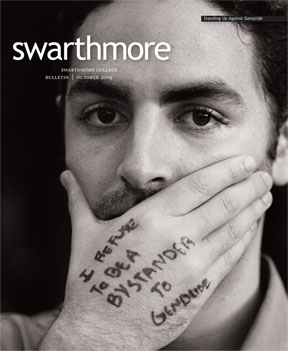Completing the Bard’s Canon
Julian Lopez-Morillas ’68 has played in or directed every one of Shakespeare’s 38 plays.

Julian Lopez-Morillas ’68 (left) performs as Cardinal Wolsey in Henry VIII at the Colorado Shakespeare Festival.
Julian Lopez-Morillas ’68 has played in or directed every one of the 38 plays that make up William Shakespeare’s canon. He passed the mark in June 2008 with a performance as Cardinal Wolsey in Henry VIII at the Colorado Shakespeare Festival.
“I started there in the summer of 1966—my first really professional theater,” Lopez-Morillas says. “I went out to Colorado every summer thereafter for eight or nine years.”
By 1984, Lopez-Morillas had done all but three or four of the Bard’s plays. “I thought, why not go the whole hog? By 1988, I’d done Timon of Athens; that left only Henry VIII. It took 20 years to find a production.”
Speaking of his accomplishment, the Berkeley, Calif., actor is wry: “It’s interesting that some people make a fuss over it. It is a curiosity. [Actor and Oregon Shakespeare Festival dramaturg] Barry Kraft’s the only other one in my acquaintance who has done it. We had a competition over it for a while; he got there first. I don’t expect people to jump up and down. There’s nothing stellar about it.”
Being a little less dismissive, Lopez-Morillas says, “I do believe being in a production of a play gets you to know it, rather than just reading it. In the practical experience of staging his plays, you get an idea how Shakespeare works, how his plays function in performance.”
Lopez-Morillas was born in Providence, R.I., where his father, a Spaniard who emigrated just before the Spanish Civil War, founded the Department of Comparative Literature at Brown University. When he arrived at Swarthmore, Lopez-Morillas says he “was thinking I was going to be an archaeologist.” He began acting halfway through his sophomore year and decided theater would be his career. At the time, there was no theater major at the College, so, after graduation, he went to Yale, eventually receiving
an M.A. in directing at Carnegie Mellon in 1972.
Lopez-Morillas soon moved to the Bay Area, where he has lived at various times in San Francisco, Oakland, and Berkeley. In the 1970s, he began a long association with the Berkeley Shakespeare Festival, now known as the California Shakespeare Theater (CalShakes). “Without being associated with a festival long-term, I never would have picked up all those performances,” he says. During a period as associate artistic director, he directed Coriolanus, Timon of Athens, King John, “knocking off some of the more obscure ones.”
“It really thrived in the ’80s,” Lopez-Morillas says of the festival, which eventually built a 545-seat amphitheater in the hills above Berkeley. He remembers a 1991 outdoor performance there of King Lear: “The wind just howls out there and there were both cows and coyotes on the hillside. If I came out as Lear and cried ‘Howl, howl, howl!’ I didn’t know whether I’d be met by yips or moos. I guess the yips were better; they sounded wild.”
This spring, Lopez-Morillas played Escalus, Prince of Verona, in Romeo and Juliet at CalShakes, directed by artistic director Jonathan Moscone—his first role with the festival since 2000.
“In the meantime, I’ve directed at San Jose State and Solano College and acted at Marin Shakespeare and San Francisco Shakespeare, where I played the Earl of Gloucester in King Lear and Prospero, the ousted Duke of Milan, in The Tempest,” Lopez-Morilla says. “If there’s a role in Shakespeare I really feel proprietary towards, it’s Prospero. I feel I bring something personal, something special to it.”
Lopez-Morillas blogs about his theater experiences on PlayShakespeare.com, a Web site created by actor and creative designer Ron Severdia. One piece of correspondence he passed along from Robert Hurwitt, theater critic for the San Francisco Chronicle. “Wouldn’t it be funny,” Hurwitt wrote, “if newspapers, which have predicted the death of theater for so long, went first?’”
This article first appeared in The Berkeley Daily Planet. It is reprinted with permission.
 Email This Page
Email This Page